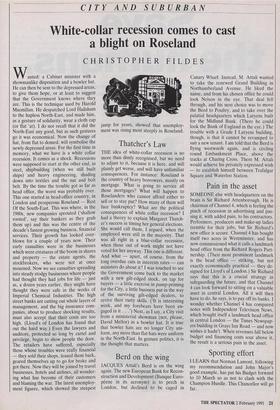CITY AND SUBURBAN
White-collar recession comes to cast a blight on Roseland
CHRISTOPHER FILDES
Wanted: a Cabinet minister with a showmanlike disposition and a bowler hat. He can then be sent to the depressed areas, to give them hope, or at least to suggest that the Government knows where they are. This is the technique used by Harold Macmillan. He despatched Lord Hailsham to the hapless North-East, and made him, as a gesture of solidarity, wear a cloth cap (or flat 'at). I do not recall that it did the North-East any good, but as such gestures go it was economical. Now the change of hat, from flat to domed, will symbolise the newly depressed areas. For the first time in memory, what we have is a white collar recession. It comes as a shock. Recessions were supposed to start at the other end, in steel, shipbuilding (when we still built ships) and heavy engineering, shading down into textiles and the nut and bolt belt. By the time the trouble got as far as head office, the worst was probably over. This one started in head-office country, in London and prosperous Roseland — Rest Of the South-East. This was where, in the 1980s, new companies sprouted (`shallow rooted', say their bankers as they grub them up) and this was the centre of the decade's fastest growing business, financial services. Their growth has looked over- blown for a couple of years now. Their early casualties were in the businesses which were creatures of the boom in shares and property — the estate agents, the stockbrokers, who were not at once mourned. Now we see casualties spreading into steady stodgy businesses where people had thought they had jobs for life — just as, a dozen years earlier, they might have thought they were safe in the works of Imperial Chemical Industries. The high street banks are cutting out whole layers of management, and the big insurance com- panies, about to produce shocking results, must also accept that their costs are too high. (Lloyd's of London has found that out the hard way.) Even the lawyers and auditors, protected so long by cartel and privilege, begin to show people the door. The retailers have suffered, especially those whose troubles were really financial — they sold their shops, leased them back, geared themselves up to go for broke and got there. Now they will be joined by travel businesses, hotels and airlines, all wonder- ing what has become of their customers and blaming the war. The latest unemploy- ment figures, which showed the steepest
jump for years, showed that unemploy- ment was rising most steeply in Roseland.


















































 Previous page
Previous page